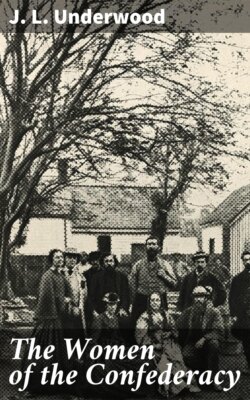Читать книгу The Women of the Confederacy - J. L. Underwood - Страница 6
На сайте Литреса книга снята с продажи.
AUTHOR’S INTRODUCTION
ОглавлениеTable of Contents
One of the last things the great Henry W. Grady said, was: “If I die, I die serving the South, the land I love so well. My father died fighting for it. I am proud to die speaking for it.” The author of this volume fought for the South and is now so afflicted that he can no longer hope to speak for the South, but he will be happy to die writing for it. Not half has yet been told of the best part of the South, her women.
The Apostle John, on finishing his gospel story of Christ, said: “And there are many other things which Jesus did, the which if they could be written every one, I suppose that even the world itself could not contain the books that should be written.” While at work preparing this volume, Mr. C. D. Kennedy, the courteous State librarian of Virginia, said to the writer it would “take a whole library to tell all about the Confederate women.” As in the life of Christ, only a small part can be told; and only a small part is necessary.
It is remarkable that the life of Christ was the most tragic, thrilling, and beneficent life the world ever saw. And yet it is all told in four booklets of simple incidents. Those four little books have been worth more to the world than all other books combined. Neither is there any system in the gospel record. There was no system in Christ’s life. It could not be told in a consecutive biography nor in a scientific treatise. Science and system all fail when it comes to telling of a life of such love and labor and sorrow.
It is not sacrilegious to say the same thing when we come to tell of the heroic lives, the courage, the trials, the work of the Confederate women. We can only give incidents, and these incidents tell all the rest.
Fortunately the author, while a patient in a Richmond hospital, has been strong enough to search the libraries of the city and gather material scattered among the Confederate records already made. With them and his own original sketches, it is hoped that a contribution of some value has been made to a good cause. The story of the Southern women is worth studying; and the author tells in his eulogy his estimate of their great virtues. Then he shows that his estimate is not from partiality or ignorance by giving a symposium of tributes from others, some from the North and some from Europe.
It may surprise some that so much attention is given to holding up the righteousness of the cause in which these women labored and suffered. Why not? The great cause ennobled them, and they adorned the Confederate cause. The truth must be told from both directions. This is the ground idea of this humble volume.
It is hoped that it will fill a good place in our Southern literature, suggesting further investigation on the same line. It has been a work of love, a comfort to him in the days of very fearful bodily affliction. He is conscious of the feebleness of his work and much indulgence is asked for.
The author deems his subject a consecrated theme. And he rejoices that he could labor at his task amid the consecrated memories of dear old Richmond, where he has had the assistance and the smiles of encouragement from the noble women who continue to keep guard over Hollywood and Oakwood Cemeteries, the Soldiers’ Home, and the Home for Confederate Women, and keep vestal watch in the Confederate Museum.
Not a line is written in sectional prejudice or tainted by a touch of hate. The author was a Confederate soldier. He hates sham, injustice, falsehood, and hypocrisy everywhere, but he loves his fellow men, and still bears the old soldier’s respect and warm hand for the true soldiers who fought on the other side. The barbarities of bummers and brutal commanders must be repudiated by us all that the honor of true soldiers like McClellan, Rosecrans, Thomas, and Buell, on the one side, and Lee, Jackson and Johnston on the other, may stand forth in its true light.
When our broad-brained and big-hearted President Roosevelt has just stepped down from the White House to tell on Capitol Hill at Richmond and at the feet of the monuments of Lee and Jackson, his great admiration for the Confederate soldiers and the Confederate women, it is time for us all to take a fresh look at their heroic lives.
J. L. Underwood.
Kellam’s Hospital,
Richmond, Va., April 1st, 1906.
